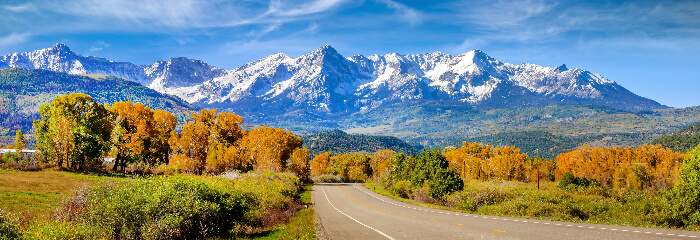State of the state: Colorado short-term rental laws
- Oct 31, 2023 | Jennifer Sokolowsky

In this series of blog posts, we offer an overview of the short-term rental (STR) lodging tax obligations for certain states, along with the latest rules on STR operations.
That “Rocky Mountain high” brings visitors to Colorado from all over the world to ski at resorts such as Vail and Aspen and enjoy the state’s many opportunities for outdoor recreation in destinations including Rocky Mountain National Park.
The state governs short-term rentals in terms of administering some lodging taxes and defining local governments’ authority to regulate STRs. But the regulations that STR operators must follow are largely determined by local governments.
Short-term rental lodging taxes
In Colorado, a number of different lodging taxes may apply to short-term rentals based on the location. These can include state sales tax, county lodging tax, local marketing district tax, and special district tax, which are all administered by the Colorado Department of Revenue. Operators may also need to collect local sales tax and/or city lodging tax, which may be administered by the Colorado Department of Revenue or the local tax authority, depending on the city and/or county. Short-term rentals are defined as reservations of less than 30 consecutive days.
Tax registration and filing
Short-term rental operators are legally required to register with the Colorado Department of Revenue for tax purposes. They can register online to receive a sales tax license. Hosts may also be required to register with local tax authorities and file local lodging tax returns, depending on the jurisdiction.
Tax collection by short-term rental marketplaces
Some vacation rental marketplaces, such as Airbnb and Vrbo, collect Colorado vacation rental taxes on behalf of operators when the listing is booked. However, marketplaces don’t collect all lodging taxes in all locations, and operators are responsible for making sure they comply with lodging tax requirements. Even if a rental marketplace collects lodging taxes, Colorado hosts are still required to register for a state tax license and file regular lodging tax returns.
Local short-term rental regulations
Colorado communities have been active in regulating STRs, especially in mountain resorts.
In Summit County, STRs have been a hot-button issue, and commissioners approved the latest regulations in March 2023. The new ordinance sets caps for the number of short-term rental licenses allowed outside of town limits and eliminates some types of licenses. The latest law updated rules set by the county in 2022.
Lakewood approved a new ordinance in March 2023 that requires short-term rental operators to be licensed. STRs may only operate in the owner’s primary residence and hosts must show proof of STR liability insurance, among other requirements.
In April 2023, Larimer County revised its short-term rental regulations. The law allows new and existing licenses to be transferred to immediate family members, mandates that STRs be separated by 500 feet in residential zones and 250 feet in Red Feather Lakes, and requires property managers to live within an hour of the properties they manage.
In 2022, leaders passed new STR laws in Aspen as well as unincorporated Pitkin County. In both areas, short-term rental operators may rent their properties out for a maximum of 120 days a year. Aspen also began requiring operators to have one of three types of STR permits. Pitkin County requires county-issued permits for STR operators and mandates a minimum stay of four nights for guests. Steamboat Springs approved a short-term rental ordinance that includes an overlay zone map and licensing requirements.
Taxing short-term rentals
Several Colorado cities voted to raise lodging taxes on STRs in the November 2022 elections. Many of those governments are using at least part of the extra revenue for affordable housing initiatives.
Aspen voters approved raising lodging taxes on STRs, with a 5% hike for properties with lodge-exempt or owner-occupied permits and a 10% increase for hosts with second-home or investment properties. The tax went into effect on May 1, 2023. At least 70% of the tax revenues will pay for affordable housing projects, with the rest going to infrastructure maintenance and environmental protection.
In Carbondale, voters approved a new 6% lodging tax on STRs to support affordable housing projects. The tax went into effect on January 1, 2023.
In Dillon, voters passed a measure to create a 5% tax on short-term rentals and raise the lodging tax from 2% to 6%, effective January 1, 2023. The funds will help pay for projects including improving streets and parking, redeveloping the town center, and upgrading the marina and workforce housing.
Steamboat Springs voters approved an initiative levying a 9% tax on short-term rentals, effective January 1, 2023. The funds will go toward affordable housing.
Summit County voters approved a new 2% short-term rental lodging tax that went into effect January 1, 2023. The funds will pay for affordable housing and childcare, among other projects.
- Several other communities in Colorado, including Dolores County, Eagle County, Estes Park, Georgetown, Gilpin County, Glenwood Springs, Julesburg, Littleton, Lyons, Nederland, and Palisade, increased lodging taxes for all types of accommodations, including hotels and short-term rentals.
Get help with Colorado short-term rental taxes
Avalara MyLodgeTax can help vacation rental hosts automate and simplify lodging tax compliance on the local and state level, including tax registration and filing. For more on STR lodging taxes in Colorado, see our state vacation rental tax guide. If you have tax questions related to vacation rental properties, drop us a line and we’ll get back to you with answers.











